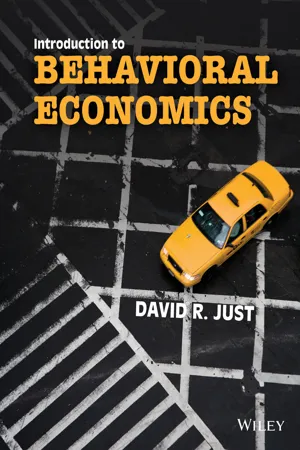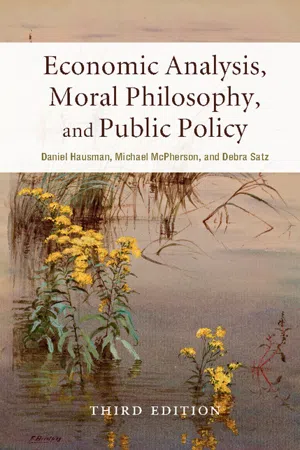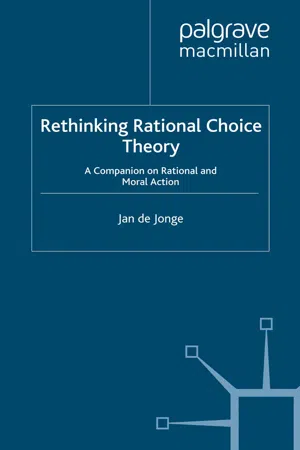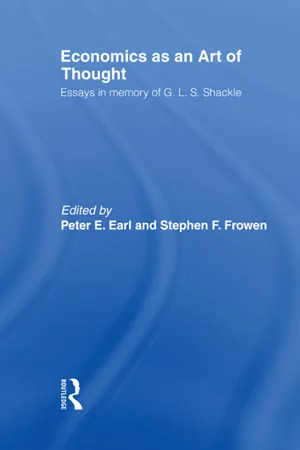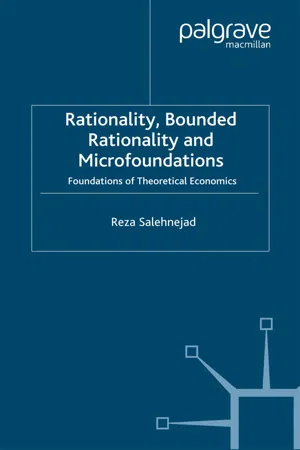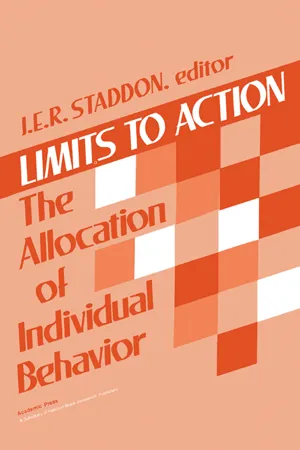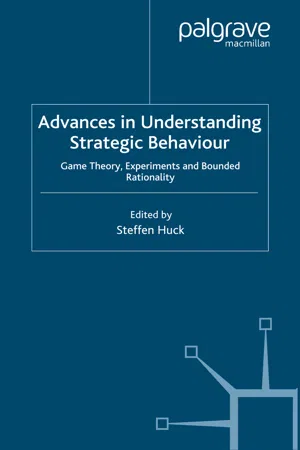Economics
Consumer Rationality
Consumer rationality refers to the idea that consumers make decisions based on their preferences and available information in a way that maximizes their overall satisfaction. It assumes that consumers are logical and consistent in their choices, seeking to maximize their utility or well-being given their budget constraints. This concept is fundamental to understanding consumer behavior and is a key assumption in economic models.
Written by Perlego with AI-assistance
Related key terms
1 of 5
7 Key excerpts on "Consumer Rationality"
- eBook - PDF
- David R. Just(Author)
- 2013(Publication Date)
- Wiley(Publisher)
Rational Choice Theory and Rational Modeling Behind every rational model is the notion that people are making optimal decisions given their access to information or the other constraints that they might face in their decisions. The most common rational models used in economics are the utility-maximization model and the profit-maximization model. The utility-maximization model assumes that the person has preferences over choices that can be expressed as a utility function. This function represents the level of enjoyment or welfare the person receives for a set of choices, often thought of as a bundle of goods that can be consumed. For example, a typical model presented in a course on microeconomics might suppose that one can consume two goods measured by the quantities x 1 and x 2 . The person’s decision problem could then be represented as max x 1 , x 2 U x 1 , x 2 1 1 subject to a budget constraint p 1 x 1 + p 2 x 2 ≤ y, 1 2 2 RATIONALITY, IRRATIONALITY, AND RATIONALIZATION where U x 1 , x 2 is the utility obtained from consuming amounts x 1 and x 2 , p 1 is the price of good 1, p 2 is the price of good 2, and y is the total budget that can be spent. The consumer’s problem in equations 1.1 and 1.2 is to find the consumption bundle x 1 , x 2 that maximizes his utility without exceeding his budget constraint. It is generally assumed that utility increases as either x 1 or x 2 increases. Further, the underlying pre- ferences are assumed to be complete and transitive. By complete, we mean that given any two possible consumption bundles, x 1 , x 2 and x 1 , x 2 , the consumer prefers bundle 1, x 1 , x 2 , prefers bundle two, x 1 , x 2 , or is indifferent between the two. No possible pair of bundles exists for which the consumer has no preference. By transitive, we mean that given any three bundles, if the consumer prefers x 1 , x 2 to x 1 , x 2 , and the consumer prefers x 1 , x 2 to x 1 , x 2 , then the consumer cannot prefer x 1 , x 2 to x 1 , x 2 . - Daniel Hausman, Michael McPherson, Debra Satz(Authors)
- 2016(Publication Date)
- Cambridge University Press(Publisher)
Similarly, the traditional theory of the firm main-tains that firms or entrepreneurs are rational and that they combine inputs so as to maximize the difference between revenues and costs. Although the theory of consumer choice and the theory of the firm make additional claims concerning the motives of consumers and entrepreneurs, they both take the theory of rational choice to be the foundation of their accounts of actual choices. Positive economics on both the consumer and the producer side can be formulated without using the word “rational.” Rather than first defining 5.1 Rationality and Positive Economics 71 “rational” and then stating that individuals are rational, economists can assert that the preferences of consumers are complete and transitive and that individuals choose whatever affordable bundle of commodities they most prefer. On the production side, economists can simply assert that firms aim to maximize profits. But the identification of what is actual with what is rational remains. This identification reflects the fact that economics simultaneously provides a theory of the causes and consequences of people’s economic choices as well as a theory of the reasons for them. In explaining actions, people sometimes cite only the agent’s beliefs or only the agent’s desires, since the other is obvious from the context. For example, when asked why he robbed banks, Willie Sutton replied, “Because that’s where the money is.” His explanation makes us laugh because, unlike most of us, Sutton thinks that the desire to steal is too obvious to need mentioning. Nevertheless, folk psychology, the pattern of explaining action in terms of the agent’s beliefs and desires (given constraints), is ubiquitous. Economic explanations of choices in terms of utility maximizing fit this pattern.- eBook - PDF
Rethinking Rational Choice Theory
A Companion on Rational and Moral Action
- Jan de Jonge(Author)
- 2011(Publication Date)
- Palgrave Macmillan(Publisher)
Maximizing behaviour thus expresses the idea that a choice is rational when the outcome of the chosen alternative is better than that of the alternative options that are taken into account. 6 The second condition for a maximizing choice concerns the ordering of preferences. Imagine an individual who has to choose between dif- ferent baskets of consumer goods. A rational ordering of his preferences for these baskets presupposes: first, that all goods are exchangeable (this is the continuity axiom, 7 that rules out any lexicographical ordering); second, if there is one more unit of some good in basket X than in basket Y, then the utility derived from the goods in basket X is greater 4 This is a rather strong assumption for it is akin to the hypothesis of rational expectations. Not all economists share this assumption, nor is it supported by ‘folk economy’, the common interpretation of economic events. Simon opted for a theory of rational choice in which the ‘global rationality’ of the economic model was replaced by a more limited, ‘bounded rationality’ in line with the amount of information that rational agents actually can process. He recommended that the commitment to substantial rationality be replaced by one of procedural rationality, wherein the latter is to be understood as behaviour that results from learning by doing. 5 Conlisk (1996) discusses the arguments pro and con the assumption of bounded rationality in detail. Usually imperfect information is attributed to satisfying behaviour. But the idea of satisfying, or bounded rationality, is not seen as an alternative to the rationality assumption, because it is considered to be just another formulation of maximizing behaviour when one takes the decision costs into account. The only exception is made for situations in which the skills of the agent are overstretched. 6 Choosing the best alternative of those available is a question of optimization. - eBook - ePub
Economics as an Art of Thought
Essays in Memory of G.L.S. Shackle
- Peter Earl, S FROWEN(Authors)
- 2013(Publication Date)
- Routledge(Publisher)
It is perhaps in the nature of fundamental concepts that they are somewhat illusive, multi-faceted and hard to pin down; almost by definition they are not readily amenable to simple definition. It is always likely, then, that they will at one and the same time be dismissed, with some irritation, as ‘mere words’ and yet will refuse to ‘go away’. The concept of rationality exhibits just these characteristics, in social theory generally and, specifically, in economics. The purpose of the following incomplete notes (and they are no more than that) is to promote discussion of the place of ‘rationality’ within economic theory by bringing together, first, some of the uses of that concept in conventional choice theory; second, some familiar criticisms of that theory; third, some notes on ‘rationality’ within Austrian economics. It is to be noted that no attempt will be made to consider any concept of ‘group rationality’, nor to assess the idea of rationality of goals and purposes, for the following notes will still be (at least) long enough. — on ‘rational goals’ see, for example, Hollis (1977, 1979) together with Williams (1979) for a contrary position.; on ‘expressive rationality’ see Hargreaves Heap (1989: ch. 8). Nor will attention be paid to the specific claims of revealed preference theory: here I can only assert my view that Wong’s critique thereof (1978) is essentially sound (albeit rather pretentious in parts). Within our restricted scope, however, we shall feel free at certain points to draw attention, albeit briefly, to the contributions of G. L. S. Shackle.It will be suggested throughout that whatever criticisms may justly be made of particular, narrow interpretations of rationality in economic theory, the fundamental idea of acting for reasons — and reasons which others can, in principle, understand — cannot be given up in any serious attempt to understand social phenomena. (Meeks 1991, has usefully emphasized the distinction between rationality as narrowly defined by many economists and rationality as being reasonable, as being sensible, in her discussion of Keynes’s ‘Chapter 12’ argument).2 CONSUMER CHOICE THEORY
Standard treatments of the now conventional consumer choice theory are shot through with references to rationality, rational behaviour, the rational consumer, and so on. Interestingly, however, the now conventional nature of the theory has not led to completely consistent usage of such terms and, indeed, has not overcome a certain embarrassment about their use. For example when, in introducing a discussion of consumption theory without transitive indifference, Chipman wrote ‘There has been increasing recognition in recent years that the hypothesis of so-called “rational” behaviour (behaviour which can be represented in terms of a total binary preference ordering) is by no means coterminous with the hypothesis that consumers act so as to maximize a real-valued function. In fact, neither supposition implies the other’ (1971: 224), he added the following note: ‘The word “rational” is enclosed in quotation marks in order to avoid the appearance of approbation’. Walsh too, in commenting on his own ‘Axioms of Rationality’ (1970: 84), leaves one wondering ‘Why then does he use the word Rationality?’ (See also the editorial introduction to Hahn and Hollis 1979: 12). There frequently seem to coexist an eagerness to make ‘rational’ and its cognates a purely technical term and a reluctance to abandon those particular words! - eBook - PDF
Rationality, Bounded Rationality and Microfoundations
Foundations of Theoretical Economics
- R. Salehnejad(Author)
- 2006(Publication Date)
- Palgrave Macmillan(Publisher)
Therefore, as soon as the structure of the economy is known, the agent’s view of the economy is also known. The economist then only needs to discover the agent’s preferences to specify the decision problem he is trying to solve, and to predict his behaviour. We will review this hypothesis to further our understanding of the current state of microeconomic theory. We end the chapter with a brief characterization of the kind of theory of behaviour that is needed for thinking about the economy. 38 Rationality, Bounded Rationality and Microfoundations 2.2 Rational choice A rational choice theory of behaviour consists of a characterization of rational behaviour and a claim that a rational individual chooses only acts that satisfy the description. The oldest concept of behavioural rational- ity defines rational behaviour in terms of pursuit of self-interest – rational behaviour is self-interested behaviour. 1 Economists flesh out the idea of pur- suit of self-interest by stating that a producer prefers more profit to less profit or a consumer prefers more money to less money. Another notion identifies behavioural rationality with the requirement that choices from different sub- sets of the universal set of available options be maximizing solutions from the respective subsets according to some binary relation R. A person is ratio- nal if his or her choice from any subset of the set of available options is the R-maximal element of the subset (Sen, 1987: 69). These definitions do not take into account the fact that full knowledge of the states of the world is never available and one always has to make decisions whose outcomes are uncertain. A theory of rational behaviour should take this ubiquitous feature of real-life decision-making seriously, and characterize rational behaviour under uncertainty. - eBook - PDF
Limits to Action
The Allocation of Individual Behavior
- J. E. R. Staddon(Author)
- 2013(Publication Date)
- Academic Press(Publisher)
The in- dividual (human) subject is said to decide among alternatives by an internal decision-making process which works like a computer. If the decision- making process is "rational," the choice behavior will maximize value according to the assumed preferences. As long as the decision-making process is rational in this sense, there is no real difference between decision theory and behavioral economics as de- scribed in previous sections of this chapter. In both cases behavior conforms to a maximization principle. The difference between decision theory and behavioral economics lies in their different explanations for failures of behavior to conform to the "rational" predictions. Such failures occur when value, according to the assumed preference structure, is not, in fact, maximized. Decision theory prescribes a standard tactic in such cases ; it retreats from the assertion that human behavior is rational and postulates various forms of less-than-perfect rationality. Thus, we have, "limited rationality," "contextual rationality," "game rationality," "process rationality," "adap- tive rationality," "selected rationality," "posterior rationality," "systemic rationality," and "bounded rationality" (March, 1978). The exercise of these forms of rationality results not in maximization but in "satisficing" (Simon, 1956). Thus, as appropriate for cognitive psychology, the main theoretical effort of decision theory is spent on revisions and elaborations of the internal cognitive mechanism that mediates between environment and behavior. A good example of this strategy in action is the "prospect theory" of Kahneman and Tversky (1979). In their experiment subjects chose among a series of gambles wherein various amounts (of money) could be obtained with various probabilities. The product of amount and probability is the expected value. Subjects are assumed to prefer higher to lower expected values. - eBook - PDF
Advances in Understanding Strategic Behaviour
Game Theory, Experiments and Bounded Rationality
- S. Huck(Author)
- 2004(Publication Date)
- Palgrave Macmillan(Publisher)
Once s/he knows the preferences, the economist allegedly can predict choices as maximizing preference satisfaction under knowledge and other con- straints. This explains why economists quite mistakenly believe that they do not need a psychological theory of how preferences are formed and decisions are in fact made. BORA: If I want to predict the effects of a bullet fired by a gun I do not need to rely on a description at the level of the molecules forming the bullet. If I want to predict the effects of human rational decision-making I do not need to go down to the level of psychological processes all the time. I should rather choose the adequate level leading to the most fruitful approach. And starting from preferences is more often than not a useful approach. As in all good empirical science, we try to formulate theories that are as general as possible and as specific as necessary. MAX: Maximization according to given preferences is and will always be at root of the economic enterprise because it is at the root of rational behav- iour. We just need to use richer utility functions than the traditional ones. The latter were dominated unduly by preferences for monetary rewards. But after appropriate enlargement of the motivational basis, maximization of utility functions explains behaviour. At least this is what should explain behaviour. Sound economic explanations of interaction in terms of rational choice rely on maximization. PSYCHE: The methodological individualism of economists like you is a strange thing. Think about it: in economic theory there is no model of the individual as a decision-maker, no model of his/her deliberation process. There is only the allegedly given preference order that serves as a shorthand symbol representing the individual and his/her decision-making process as maximization. MAX: Indeed, since we are interested chiefly in human interaction we treat the human individual more or less as a black box.
Index pages curate the most relevant extracts from our library of academic textbooks. They’ve been created using an in-house natural language model (NLM), each adding context and meaning to key research topics.
